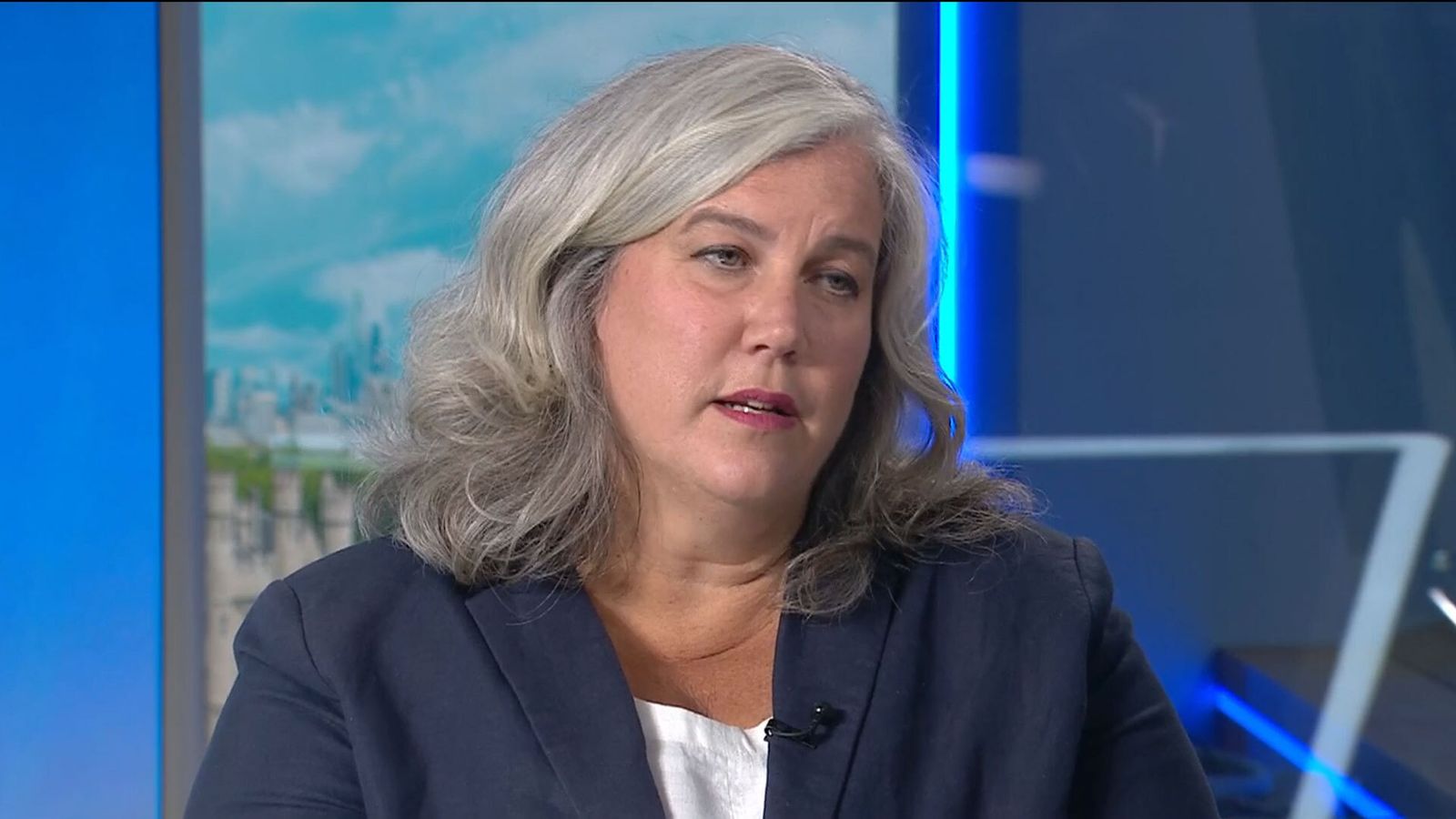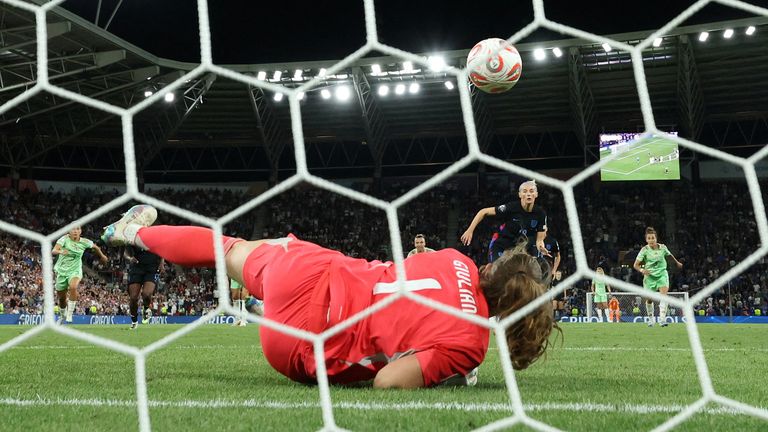The US is sounding the alarm on fluoride in drinking water - what's the story in the UK?
The debate around whether fluoride should be added to tap water is not new.

The practice, which is aimed at reducing tooth decay, has been ongoing for 60 years.
But since fluoride toothpaste became more widely available around the 1970s, more questions have been raised about whether adding it to the drinking supply is still necessary.
And with Donald Trump's health secretary pick Robert F Kennedy Jr saying he would ban it, the issue has entered public debate yet again.
Despite RFK being well known for his outlandish views on public health, it seems the fluoridation issue isn't one that can be totally dismissed.
One study in the US has linked fluoride to a lowering of children's IQs, while another in the UK has questioned its overall effectiveness when added to water.
What is fluoride and what does it do?
It's a natural mineral found in rocks, which leaches into soil, rivers and lakes.
It helps dental health by strengthening the tooth enamel, making it more resistant to tooth decay, and also reduces the amount of acid the bacteria on your teeth produce, according to the Oral Health Foundation.
Fluoride is known to be particularly beneficial for children's teeth, as past studies have suggested ingesting it during the period of tooth development makes the enamel more resistant to later acid attacks and subsequent development of tooth decay.
Dr Kunal Patel, who has been a private and NHS dentist for 15 years, told Sky News the benefit of fluoride is "drilled into" dental students, adding there are "scientifically proven benefits of having fluoride within your oral hygiene regime".
Fluoride is essentially a passive way of protecting your teeth, he says.
"If you decide not to use fluoride then the technique of brushing your teeth, your flossing and other methods of cleaning have to be that much better," he adds.
How do we get fluoride?
Almost all water contains some naturally occurring fluoride, but it's normally not enough to prevent tooth decay.
Some areas do have water supplies where the amount of fluoride is naturally at a high level - a point that will be covered later.
We get trace amounts of fluoride from much of our food and drink, but brewed tea in particular proves a big source because tea plants take up fluoride from soil.
Most toothpastes now contain fluoride to give you extra protection from decay.
When did adding it to the water supply become a thing?
Many oral health experts believe adding fluoride to water - an act known as fluoridation - is the most effective way to widely reduce dental problems, particularly in underprivileged regions.
The practice began in 1945 in Grand Rapids, Michigan, after scientists noticed that people had less tooth decay in areas with naturally higher fluoride levels in the tap water.
It was first added to the water supply in England in 1964, when a pilot scheme was launched in Birmingham.
Over the years it's been rolled out to about 75% of America's population, compared to about 10% of England.
The World Health Organization (WHO) estimates some 400 million people in 25 countries are getting artificially fluoridated water, while about 50 million have naturally occurring fluoride at the same level as the artificial schemes.
What is the ideal amount of fluoride in water?
The WHO recommends a maximum level of 1.5mg per litre.
In its guidelines, it says the level is aimed at creating a middle ground where tooth decay is minimised, but the risk of dental fluorosis and skeletal fluorosis is too.
Dental fluorosis is a common cosmetic condition caused by ingesting too much fluoride during tooth development, and can leave white flecks, spots or lines on teeth.
Skeletal fluorosis, a much rarer occurrence, is a chronic metabolic bone and joint disease caused by ingesting large amounts of fluoride.
The UK government aims for fluoride levels of 1mg per litre in drinking water, while the level of fluoride is kept at about 0.7mg per litre in the US.
Potential danger to children's IQs
Fluoridation has been a contentious subject in the US, with more than 100 lawsuits over the years trying to get rid of it without success, according to the American Fluoridation Society, an advocacy group.
And the anti-fluoride group Fluoride Action Network says more than 150 towns and counties across the US have voted to keep fluoride out of public water systems or to stop adding it.
But the movement against it really gained momentum earlier this year when a US government report concluded that fluoride in drinking water at twice the recommended limit was linked with lower IQ in children.
The report, based on an analysis of previously published research, said it reached its conclusion "with moderate confidence".
It cited a 2019 study, published in the well-respected journal JAMA Pediatrics, which found that IQ levels were slightly lower in three and four-year-old children whose mothers had higher measures of fluoride in their urine when they were pregnant.
A federal judge in California used the report to order the nation's Environmental Protection Agency (EPA) to strengthen its regulations on fluoridation in September, saying the current levels were posing an unreasonable risk to children.
The judge stressed that he was not concluding with certainty that fluoridated water endangered public health, but rather that it poses a risk.
Questions over fluoride's effectiveness
In the UK, while the government is reviewing plans to raise fluoride levels for millions and roll it out into more areas of England, a major review has suggested fluoridation may only have a "modest" benefit.
Academics at Manchester, Dundee and Aberdeen universities compared 157 studies looking at the effect of fluoridation on the dental health of communities.
When the government began adding fluoride to tap water, it reduced the number of decayed, missing or filled teeth by two whole teeth on average among children with their baby teeth, researchers said.
However, once fluoride toothpaste became widely available, that number declined.
Now, it is equivalent to a reduction of a "quarter of a tooth" that is decayed, missing or filled, on average.
"Water fluoridation is only having a modest benefit on dental caries, and those benefits may take years to be realised," said Professor Anne-Marie Glenny, of the University of Manchester, who co-authored the paper.
Could it actually be scrapped in the US?
Mr Kennedy Jr has claimed Mr Trump will push to remove fluoride from drinking water on his first day in office, referring to it as "industrial waste" in a statement on X.
He also claimed fluoride was associated with arthritis, bone fractures, bone cancer, neurodevelopmental disorders and thyroid disease.
While there have been studies regarding some of those claims, none of them have been conclusive.
After the comments, Mr Trump told Sky News' US partner NBC News that while he had not spoken to his health secretary pick about trying to scrap fluoride yet, "it sounds OK to me. You know it's possible".
The decision on whether or not add fluoride to water is ultimately made by state and local health authorities, so Mr Trump's government can only advise them to stop it.
'It's about risk vs benefit'
Stephen Peckham, professor of health policy at the University of Kent, previously led a study on fluoridation's potential links to hypothyroidism - an underactive thyroid - and is now part of a research team investigating whether it could be causing IQ issues within the UK's population.
He tells Sky News he accepts fluoride can be beneficial, but adds it is not a necessity, especially in water.
"We know that ingested fluoride is not an effective way of preventing tooth decay," he says. "If you want to have fluoride, put it on your toothbrush and clean your teeth with it. It needs to be applied to the tooth and not swallowed."
He says that while the benefit is limited, the children's IQ study carried out in the US highlights a need for caution.
"What we do know is that ingesting fluoride does have a neurologic, neurotoxic effect. What's less certain is at what level of fluoride that begins.
"The judge is saying, well, in that case, shouldn't we be more careful? And limit in particular pregnant women's access to fluoridated water or consumption of fluoridated water.
"And your maximum of fluoride depends on how much you drink. So if you drink more, you get more."
It's about the "balance of risk and benefit", he says.
"But if there's not much benefit, should you have any risk? The answer is no, you shouldn't."
'Stick to the most deprived regions'
Dr Kunal Patel, who owns six private dental clinics in Surrey, including one for children only, says fluoridation was "great in a time where there was less education and less access to fluoride in toothpaste".
He adds that before the IQ study came out, he would have been happy to see fluoride being added to any area in the UK because he'd have thought "anyone could benefit" without there being any negative effects.
Now, he says, he thinks it's best to be "selective" and limit fluoridating water "to the areas that are suffering, where it's more rural or more deprived".
He gives the North West as an example, saying he recently did a charity event there to promote dental health among young people, and it was "shocking" to see how many of them did not even own a toothbrush.
He says it's a "good idea" to expand to similar areas of the UK where dental health is low - but thinks it would be an even better idea to provide toothpaste to schools in such areas and increase their education regarding how best to look after their teeth.
"I think education is the way forward more so than fluoridated water."
A Department of Health and Social Care spokesperson told Sky News: "The number one reason children aged six to 10 end up in hospital is to have their rotting teeth pulled out.
"Water fluoridation at levels permitted in this country is a safe and effective public health measure that reduces tooth decay.
"Prevention is always better than cure, and this government is committed to helping people stay healthy and keeping kids out of hospital."
Is your water being fluoridated?
About 330,000 people live in areas of England with naturally occurring fluoride in drinking water, while around 5.8 million people get an artificial supply put in theirs.
It means some 10% of people in England live in areas where fluoride is added to the water, mainly in the West Midlands and the North East.
There is no fluoridation in Wales, Scotland or Northern Ireland.
Here is the full list of areas receiving artificial fluoridation in England, according to the British Fluoridation Society:
- Cumbria - 120,000
- Cheshire - 137,000
- Tyneside - 643,000
- Northumbria - 101,000
- County Durham - 85,000
- Humberside - 136,000
- Lincolnshire - 250,000
- Nottinghamshire - 287,000
- Derbyshire - 43,000
- Birmingham - 1,000,000
- Solihull - 200,000
- Coventry - 300,000
- Sandwell - 300,000
- Dudley - 305,000
- Walsall - 253,000
- Wolverhampton - 236,000
- Staffordshire - 497,000
- Shropshire - 22,000
- Warwickshire - 431,000
- Worcestershire - 253,000
- Bedfordshire - 198,000
And here is the list of areas getting the "optimal" amount of fluoride naturally:
- Hartlepool, County Durham - 89,000
- Easington, County Durham - 47,000
- Uttoxeter, Staffordshire - 13,000
- Redbridge, London Borough - 180,000
Where else could fluoride be added to water?
The Conservative government introduced proposals to expand fluoridation schemes across the North East "because of the significant and long-standing inequalities in the region" when it comes to dental health.
A public consultation on the plans was launched in June and closed in July. Since Sir Keir Starmer's Labour government won the election, it has not been clear whether the plans are still being pursued.
These are the areas the government proposed extending the fluoride supply to:
- Darlington
- Durham
- Gateshead
- Hartlepool
- Middlesbrough
- Newcastle
- Northumberland
- North Tyneside
- Redcar and Cleveland
- South Tyneside
- Stockton
- Sunderland
-SKY NEWS







